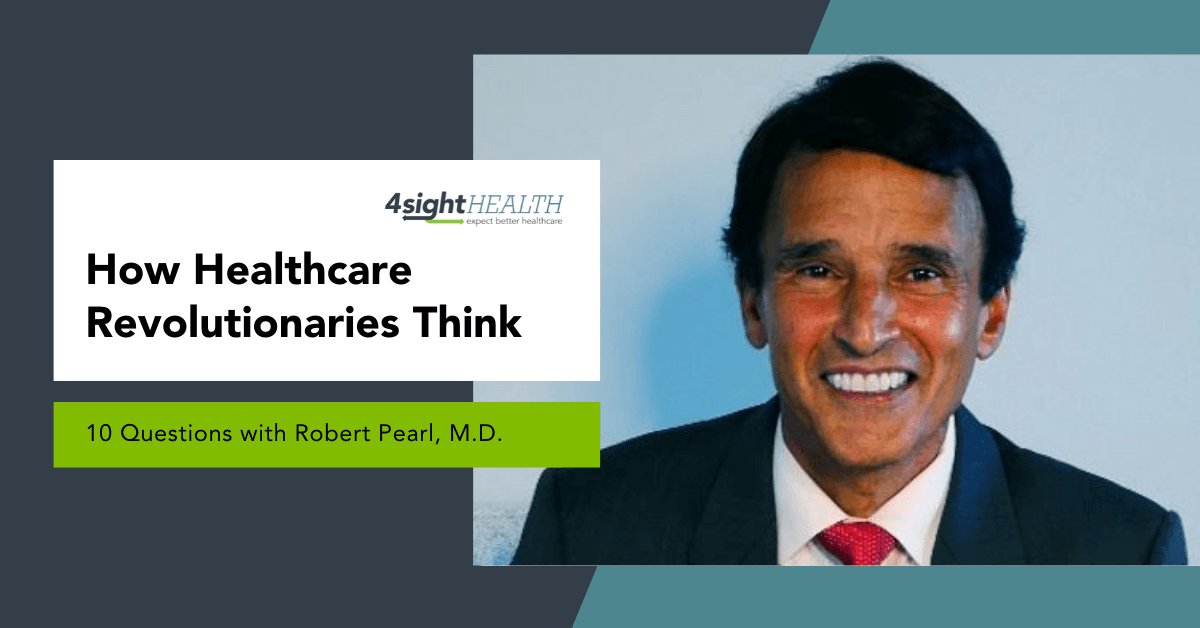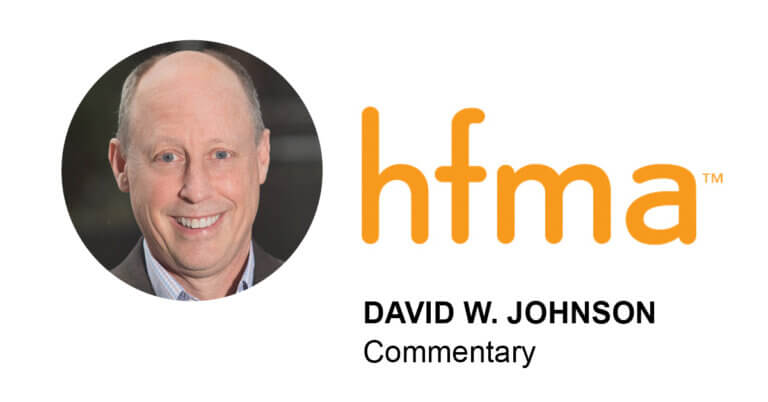May 27, 2021

How Healthcare Revolutionaries Think: 10 Questions with Robert Pearl, M.D.
Welcome to the latest installment of 4sight Health’s monthly interview series, How Healthcare Revolutionaries Think. The interview series features healthcare instigators who believe that outcomes matter, customers count and value rules.
A revolutionary’s ability to effect change depends as much on the effectiveness of their communication platform as the power of their actual message. Earlier this year, Robert Pearl, M.D., used his position as a regular contributor to Forbes to make airline travel safer for passengers.
In a March 15 piece, Dr. Pearl, the former CEO of The Permanente Medical Group (Kaiser Permanente), described his experience of being coughed and sneezed on by a COVID-infected passenger sitting right behind him on a flight from San Diego to New York and the reluctance of the flight crew to intervene to protect him and others from the clearly infectious traveler.
More than 250,000 people clicked on and read his column, according to Dr. Pearl, who said he received dozens of emails from flight attendants, pilots and passengers who credited his column with giving them the courage to identify, report and stop COVID-infected passengers at the gate before they boarded and potentially exposed others to the deadly virus.
It’s was just another day in the life of Dr. Pearl, who has made a career of saving people from the system as he uses his multichannel communication platform to push for change. We spoke with Dr. Pearl about why he does what he does, and why healthcare needs revolutionaries now more than ever.
1. When you think of a healthcare revolutionary, what comes to mind? What makes someone a healthcare revolutionary?
Dr. Pearl: The word revolutionary implies that the change is going to be major. You can even label it radical rather than simply evolutionary. It’s the difference between disruption and incremental improvement. If you think about it that way, what does it require? It requires a willingness to take chances, the ability to dream big, a lack of fear of failure, and maybe most importantly, the confidence to get up after you fall down and try again.
2. Do you consider yourself to be a healthcare revolutionary?
Dr. Pearl: I really have never thought of myself as a revolutionary. I just think of myself as someone who has had a lifelong passion to improve the U.S. healthcare system and the health of all our people. But I guess within the context that you’re describing, there’s no question I’m a revolutionary. People always ask me whether I’m afraid or concerned about pushback to my criticisms or my ideas, and my response is simple. If you’re not getting pushback, you’re not doing a good enough job.
3. You ran the Permanente Medical Group for nearly 20 years. What was your most radical idea and did that idea change or evolve over time?
Dr. Pearl: Before I became the CEO in 1999, Kaiser’s business model or strategy was to be the low-cost leader. Quality was good but not great. Service was good but not great. That worked in the past because our prices were the lowest in all our markets. But I didn’t think it would work in the future as patients became more informed consumers. Moreover, I didn’t want to invest my time in a low-cost strategy alone. So, our new strategy was great quality and great service but at a competitive price. We were still priced below our competitors, but our strategy focused on excellence in quality and service. That’s value. Better outcomes for less. As for wavering, we never did during my 18 years as CEO. Even when there was a downturn in the economy, we stuck with the plan. We didn’t bounce from one thing to another based on what was shiny and new. It was the right idea and helped us become the national quality leader based on NCQA data.
4. Revolutionaries have disciples. You have students. You teach at Stanford in both the medical school and the business school. How are medical students and business students different?
Dr. Pearl: The students are very different even though their two collections of buildings are separated by only a mile. Most medical students believe they’re entitled to certain things because they’re spending a decade as a student or resident training to provide great care to patients. They expect a certain amount of respect and esteem. They expect a certain amount of income with minimal risk. They expect a certain amount of privilege. You go a mile away, and most of the business school students don’t care about any of that. What most care about is creating a company that’s capable of generating a significant amount of revenue and turning a big profit. The greater the revenue, the higher the profit, the more success they will feel.

By Sundry Photography / Shutterstock.com
5. Do you see any revolutionary behavior in your medical students or in your business students?
Dr. Pearl: In medicine, failure is not an option. It’s disastrous. If something goes wrong, and a patient has a complication or dies, that’s terrible. In business school, entrepreneurial risk is encouraged. Failure can be a badge of honor. The idea is, if you haven’t failed a couple of times in bringing a new company to the marketplace, you haven’t dreamed big enough or taken enough risk. The mindsets in the two schools couldn’t be any more different, and I would say the difference is bigger now than it ever has been before.
6. Do any of your med students sneak into a business lecture or any of your business students sneak into a medical lecture? And you bust them and ask what they’re doing here?
Dr. Pearl: A few years ago, I wrote a piece for the New England Journal of Medicine on why every fourth-year medical student should spend a month at the business school. I think that’s even more true today. You would learn a lot of skills that they don’t teach in medical school but are critical to your success as a doctor and healthcare leader. Things like leadership, creating and working in groups, figuring out your competitive advantages, utilizing new technologies. These are skills we need in medicine if we’re going to make American healthcare the best once again in the world. To their credit, we do have quite a few medical students who take a class in our business school or who get their MBA. Some of them don’t plan on practicing medicine but working in healthcare in other capacities. Others are committed to leading the process of change. And similarly, we do have quite a number of business school students who attend lectures on healthcare policy, healthcare economics, healthcare technology and healthcare leadership in our medical school.
7. Do those crossover students make you optimistic about the future of the U.S. healthcare system?
Dr. Pearl: That’s a difficult question to answer because I’m optimistic that positive change will happen, but I don’t think it will begin in academia. As we exit the pandemic, as a nation we’re going to have to pay back trillions of dollars the fedetral government borrowed, and we will have to deal with residual unemployment from all the businesses that have closed. To generate the dollars, we’ll need to lower healthcare costs, which account for nearly 20 percent of the U.S. gross domestic product. You can lower healthcare spending in only one of two ways: rationing or capitation. Both set a ceiling. No one wants rationing. That leaves capitation. That’s where I see students with the medical expertise and the business expertise making a difference. They’ll have the skill sets to manage clinical and financial risk, and they’ll need each other. Together, they can make care more convenient for patients, apply useful technologies and improve operational excellence. I guess that makes me optimistic about in the future, but worried about healthcare in the short term.
8. What do you think of organized medicine? Is organized medicine a driver of change or maintainer of the status quo?

Dr. Pearl: Organized medicine has definitely been a stumbling block to progress. The reality is that despite healthcare’s many problems, most physicians don’t want to change the way they practice. As a result, the organizations they pay dues to won’t advocate for change. Organizations like the AMA and national specialty societies exist to support the desires, values, beliefs and norms of their members. During COVID-19, you didn’t see national medical organizations screaming and yelling about the lapses in prevention that cost tens of thousands of lives or apologizing, at least until recently, for the lack of equity in medical care. You don’t see specialty surgical or medical societies promoting more primary care. Each organization in medicine defends its turf and its members’ turf. You can add hospital organizations, health insurance organizations and pharmaceutical organizations to that list. They’re all firmly entrenched, and why shouldn’t they be? They’ve all done well, and most of their members have done well, even during a pandemic. We’ve been talking about transforming American medicine since Truman. Maybe even Roosevelt. And yet the United States has the most expensive and least effective healthcare system in the developed world.
9. So, where is the revolution going to come from? Certainly not from industry incumbents and not from medical/business school graduates, at least not yet.
Dr. Pearl: It might come from one of two places. One place is the purchasers. No one pays contractors on a time-and-material basis anymore. They’re paid a set fee with quality and service guarantees. In healthcare we’d call this method of funding “capitation.” And when you do that, physician culture evolves. Doctors value prevention and patient safety more. They embrace patient convenient technologies like telemedicine. They eliminate the 30 percent of procedures and tests that add no value. It’s all about incentives. Business school professors say, “If you tell me about your incentives, I’ll tell you how people behave.” If we want healthcare to change, one approach is for purchasers and insurers to change how they reimburse doctors and hospitals. The other possibility is Amazon. Three years ago, when Haven was formed by the CEOs of JPMorgan Chase, Berkshire Hathaway and Amazon, I told people that if they thought Jeff Bezos got involved with Haven as a not-for-profit only to care for his employees, they probably also believe that Amazon only sells books. Amazon uses technology to eliminate time and distance in consumer purchasing. It will do the same to eliminate time and distance in how people access medical care. Amazon has a lot of clout. Not only does it employ close to 1 million people, but the CEOs of other companies are likely to join in the revolution if doing so will make their employees healthier at a lower cost.
10. You write books. You publish a newsletter. You do a podcast series. You contribute pieces to other publications. You teach. You give speeches. From the standpoint of a revolutionary, which channel is the most effective in getting your message out?
Dr. Pearl: Most of the revolutionary ideas I have, I got from someone else who actually came up with the idea, did the work and made the hard changes. As CEO, I would travel across the country, observe the impact of each innovation, select the best and expand the scale and scope of their success. My job now is spreading those ideas more broadly across the industry and the nation. To that end, I don’t see the path forward as relying on one channel versus another. Everyone picks their own channel to receive information. To create lasting change, you need to reach a critical mass. To achieve that, you have to go anywhere people are willing to listen to your message. Of the list you mentioned, the one I enjoy most is my Monthly Musings on American Healthcare newsletter. I make it available on my website robertpearlmd.com at no cost. It now has close to 15,000 subscribers, and I feel like I have 15,000 friends who I can tell anything to and who can — and do — tell me where they agree and where I’m wrong.
If books are your preferred communications channel, Dr. Pearl’s latest book is called Uncaring: How the Culture of Medicine Kills Doctors and Patients, published May 18, 2021, from PublicAffairs. Sounds like nonfiction horror to me.
You can order a copy here. All proceeds from Pearl’s book go to Doctors Without Borders.
Thanks to Dr. Pearl for his time and his willingness to share his thoughts with the 4sight Health audience and his relentless pursuit of a better healthcare system for patients.
Healthcare Revolutionary Dr. Robert Pearl
Named one of Modern Healthcare’s 50 most influential physician leaders, Dr. Robert Pearl is an advocate for the power of integrated, prepaid, technologically advanced and physician-led healthcare delivery. He serves as a clinical professor of plastic surgery at Stanford University School of Medicine and is on the faculty of the Stanford Graduate School of Business, where he teaches courses on strategy and leadership, and lectures on information technology and health care policy.
He is the author of Mistreated: Why We think We’re Getting Good Healthcare—And Why We’re Usually Wrong, a Washington Post bestseller that offers a roadmap for transforming American healthcare. All proceeds from the book go to Doctors Without Borders. His next book, Uncaring: How the Culture of Medicine Kills Doctors and Patients, published in May 2021.
Dr. Pearl hosts the popular podcasts Fixing Healthcare and Coronavirus: The Truth. He publishes a newsletter with over 12,000 subscribers called Monthly Musings on American Healthcare and is a regular contributor to Forbes. He has been featured on CBS This Morning, CNBC, NPR, and in TIME, USA Today and Bloomberg News. He has published more than 100 articles in medical journals and contributed to numerous books. A frequent keynote speaker at healthcare and medical technology conferences, Pearl has addressed the Commonwealth Club, the World Healthcare Congress, the Institute for Healthcare Improvement’s National Quality Forum and the National Committee for Quality Improvement (NCQA).
Board certified in plastic and reconstructive surgery, Pearl received his medical degree from the Yale University School of Medicine, followed by a residency in plastic and reconstructive surgery at Stanford University. Pearl is also the former CEO of The Permanente Medical Group (1999-2017), the nation’s largest medical group, and former president of The Mid-Atlantic Permanente Medical Group (2009-2017). In these roles he led 10,000 physicians, 38,000 staff and was responsible for the nationally recognized medical care of 5 million Kaiser Permanente members on the west and east coasts.
Read More Healthcare Revolutionary Interviews
- Gaurov Dayal, M.D. Everside Health, February, 2021
- Thompson Aderinkomi Nice Health March, 2021
- Jon Pearce Zipnosis, April 2021
- Kurt Waltenbaugh Carrot Health, May 2021





